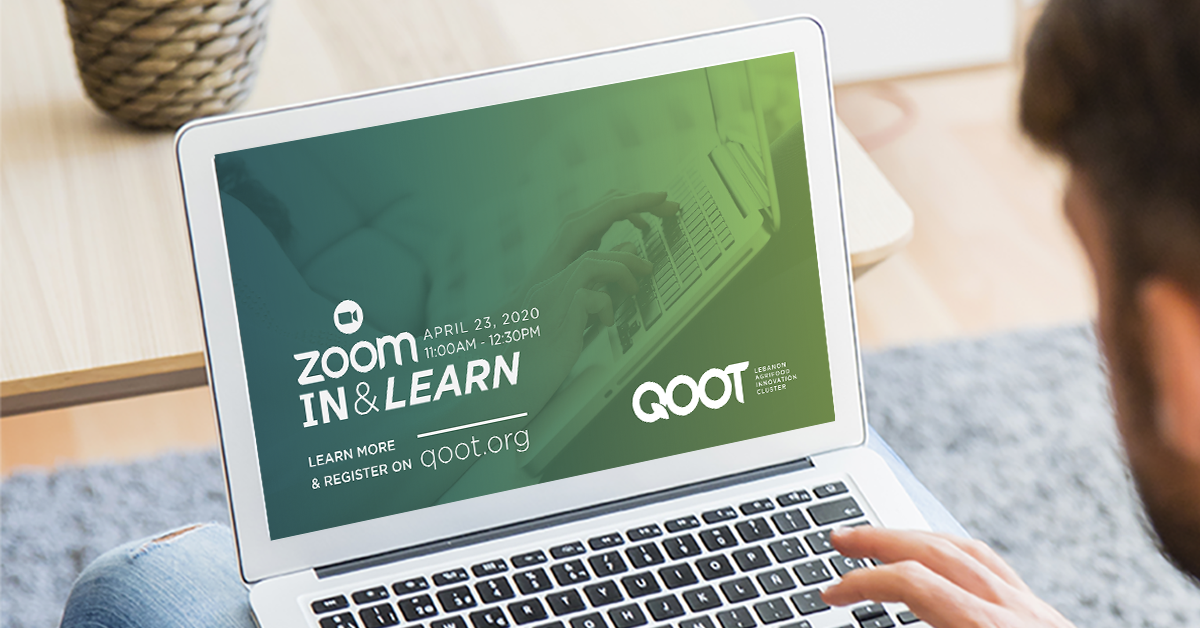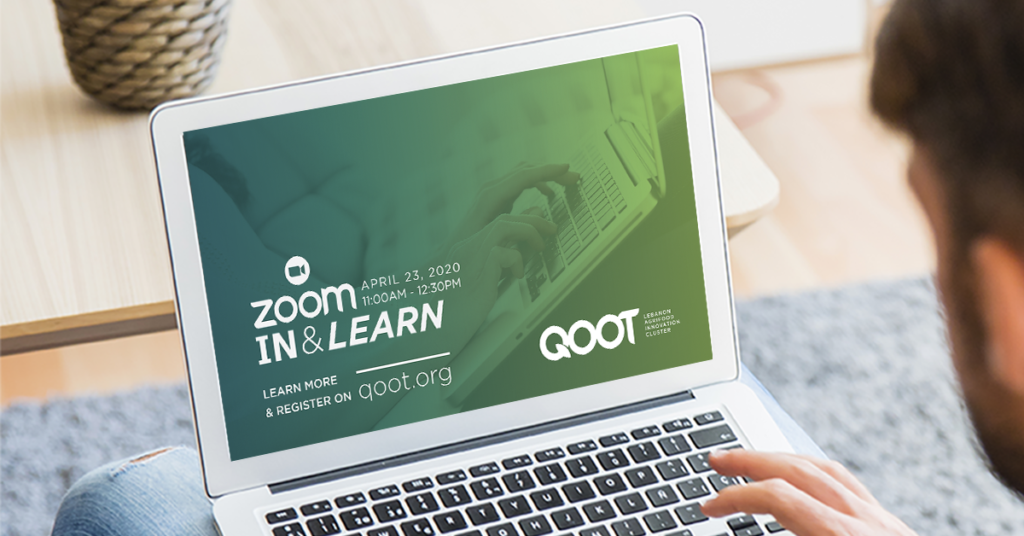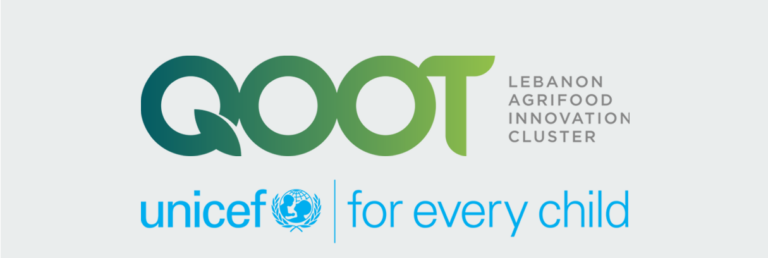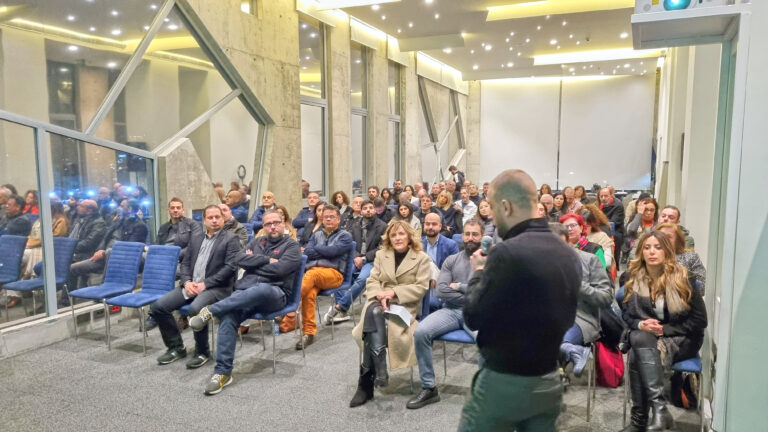
In its second Zoom In & Learn edition, QOOT Cluster brought together Lebanese enterprises and SMEs, knowledge providers and support institutions to learn about joint R&D projects, shedding light on consumer behavior in the current economic situation.
Collaboration to overcome the economic situation
Due to the current economic crisis as well as the COVID-19 pandemic, Lebanon is facing one the most critical economic situations ever experienced leading to businesses suffering and struggling to survive. QOOT Cluster brings together Lebanese MSMEs and large companies working on innovation in the agri-food value chain, to collaborate, support and work together to overcome the situation and push the sector forward.
Youssef Rifai, Vice-President of QOOT Cluster and Operation Manager at A Rifai Roastery, emphasizes on the importance of innovating in the sector and collaborate with different players in the industry, “QOOT Cluster is facilitating matchmaking between companies and is partnering with the academic institutions in Lebanon such AUB, USJ, University of Balamand and AUST to allow the members as well as the academia to benefit from each other in nurturing the birth of new projects.”
Rifai added: “Sharing ideas, best practices and new processes, linking these different dots and pushing for new ways to help the sector in general can only push and promote Lebanese agri-food products locally and internationally. Innovation is the drive and fuel that will bring higher efficiency, higher output and maintain, if not enhance, the quality”.
To do so, QOOT Cluster invited three guest speakers to discuss the importance of a collaborative strategy to overcome the current situation in Lebanon. The speakers included Dr. Rodrigue Balaa – Chairperson of the Department of Agricultural Engineering Technology at the Issam Fares Faculty of Technology of the University of Balamand, Jimmy Ghazal – Founder of MindLab and Senior Executive Advisor at Le Charcutier supermarket chain, and Nadine Tawk – SME and Partnerships Manager at Palladium, LEEP UKAID-funded program.
The interventions ended with a great exchange, where the different academics and professionals discussed the future steps to strengthen the collaboration between academia and the private sector.
Industry-academia partnerships: The Role of Academia in supporting the Lebanese agri-food industry
Dr. Rodrigue Balaa emphasized on the importance of collaboration between the sector and academia to accelerate innovation bringing many examples on how, through QOOT Cluster, the University of Balamand had collaborated on applied research projects with two QOOT Cluster members: SMLC, and Brasserie Almaza.
Dr. Balaa presented a Quintuple innovation helix framework done in collaboration with Industry through QOOT Cluster member Robinson Agri, with Academia (University of Balamand-IFFT), with the Civil society (FairTrade Lebanon-cooperatives), and the Public Sector (Municipalities) within the Knowledge Economy.
Dr. Balaa stressed on the fact that Lebanese industries should turn the challenges, from the complex financial situation Lebanon is facing due to local monetary devaluation to the consequences of the pandemic on the sector, into opportunities, by pushing Lebanese companies to fill the need of the market, start exporting, and start producing locally.
He ended his presentation by stressing on the importance of increasing collaboration between municipalities and local communities, adapting the academic curricula to prepare graduates for the highest level of self-sufficiency within the framework of a circular economy, and supporting applied research to create innovative solutions for local agri-food challenges.
QOOT Cluster signed several Memoranda of Understanding with major universities in Lebanon, one of them being the University of Balamand. Read more
Consumers Behavior In Light Of The Current Situation
After presenting the importance of the relation between academia and industry, Jimmy Ghazal presented the consumer behavior changes due to the current situation.
The COVID-19 virus has affected consumer behavior, turning the mobile way of life into an astatic life. Consumers are lacking mobility and dependency, and to survive, companies need to adapt to these changes.
Ghazal commented, “You might need to reduce several items of your brand and build on the two most performing ones. Now, it is all about survival and not the ego of your brand. The ego of your brand can be regenerated, but your company can’t be”. He stressed on the importance of maintaining the reputation of the brand and finding ways to continue bonding with customers, focusing on the rise of creativity during the lockdowns. People are experimenting and finding ways to do things themselves.
Lebanon is used to being dependent on imports, which is affecting the prices with the monetary devaluation, Ghazal stressed on the importance of turning such challenges into opportunities by starting to produce locally and export. He explained that even if companies managed to build a loyalty bond with their customers, the new behavior is turning towards “availability as a new need” and “Cheaper is better”, especially in Lebanon where not only were the Lebanese affected by the economic crisis, but by the pandemic as well.
Ghazal advised the attendees to lead their team with certainty and by example, to be able to move forward. The key, he explains, is to communicate effectively, boldly, clearly, honestly, and compassionately, with the team. He also presented case studies of international companies that managed to turn challenges into opportunities by changing their initial offerings.
Some companies will not survive, because first, they can’t adapt to the situation, or they are too slow to react, or cannot afford the process. He stressed that two of the three factors are controllable: “As businesses, we need to be prepared for the after COVID-19, adapt to the situation and not be too slow to react to be able to survive.”
SME Grants Opportunities: LEEP- UKaid
In order to support SMEs, QOOT Cluster invited Nadine Tawk from the Lebanon Enterprise and Employment Program to present LEEP-UKaid to give an overview of how SMEs tocanbenefit from the program and overcome the current economic situation.
LEEP focuses on creating sustainable jobs through SME growth, targeting SMES of any sectors through matching grant funds, technical assistance based on need assessment, or wage subsidies.
To read more about the LEEP program visit www.leeplebanon.com.





